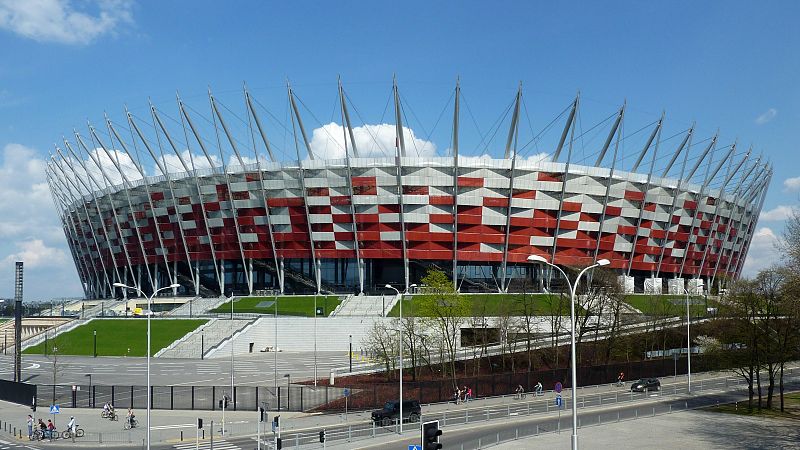The 2012 UEFA European Football Championship, commonly referred to as Euro 2012, is the 14th European Championship for national football teams organised by UEFA. The final tournament is being hosted by Poland and Ukraine between 8 June and 1 July 2012. It is the first time that either nation has hosted the tournament. This bid was chosen by UEFA's Executive Committee in 2007.[1]
The final tournament features 16 nations, the last European Championship to do so (from Euro 2016 onward, there will be 24 finalists). Qualification was contested by 51 nations between August 2010 and November 2011 to join the two host nations in the tournament. The winner of the tournament gains automatic entry to the 2013 FIFA Confederations Cup hosted by Brazil.[2]

Host selection
The joint Poland–Ukraine bid was chosen by a vote of the UEFA Executive Committee at a meeting in Cardiff on 18 April 2007, defeating both Italy and a Croatia–Hungary bid.[1] Poland–Ukraine became the third successful joint bid for the European Championship, after those of Belgium–Netherlands (2000) and Austria–Switzerland (2008). Italy had been considered favourites to win the hosting but incidents of fan violence and a match fixing scandal were widely cited as factors behind their failure.[3][4][5]

Venues
Eight cities have been selected by UEFA as host venues. In a return to the format used at Euro 1992, Euro 1996 and Euro 2008, each of the four groups will be based around two stadiums each.
The host cities Warsaw, Gdańsk, Wrocław, Poznań, Kiev, Lviv are all popular tourist destinations, unlike Donetsk and Kharkiv (the latter having replaced Dnipropetrovsk as a host city in 2009).[6]
The obligatory improvement of the football infrastructure includes the building of new stadiums: six of the eight venues are brand new stadiums currently being constructed ready to open in advance of the tournament; the remaining two (in Poznań and Kharkiv) have undergone major renovations to improve them.[7][8] Three of the stadiums will fulfill the criteria of UEFA's highest category stadiums.

Stadiums
| Warsaw | Gdańsk | Wrocław | Poznań | ||||
| National Stadium Capacity: 58,500[9] | PGE Arena Capacity: 43,600[10] | Municipal Stadium Capacity: 42,800[11] | Municipal Stadium Capacity: 43,300[12] | ||||
| 3 matches in Group A (including opening match), 1 quarter-final and 1 semi-final | 3 matches in Group C and 1 quarter-final | 3 matches in Group A | 3 matches in Group C | ||||
 |  |  |  | ||||
| |||||||
|---|---|---|---|---|---|---|---|
| Kiev | Donetsk | Kharkiv | Lviv | ||||
| Olympic Stadium Capacity: 60,000[13] | Donbass Arena Capacity: 50,000[14] | Metalist Stadium Capacity: 35,000[15] | Arena Lviv Capacity: 30,000[16] | ||||
| 3 matches in Group D, 1 quarter-final and the final | 3 matches in Group D, 1 quarter-final and 1 semi-final | 3 matches in Group B | 3 matches in Group B | ||||
 |  |  |  | ||||
Note: Capacity figures are those for matches at UEFA Euro 2012 and are not necessarily the total capacity that the stadium is capable of holding.

No comments:
Post a Comment